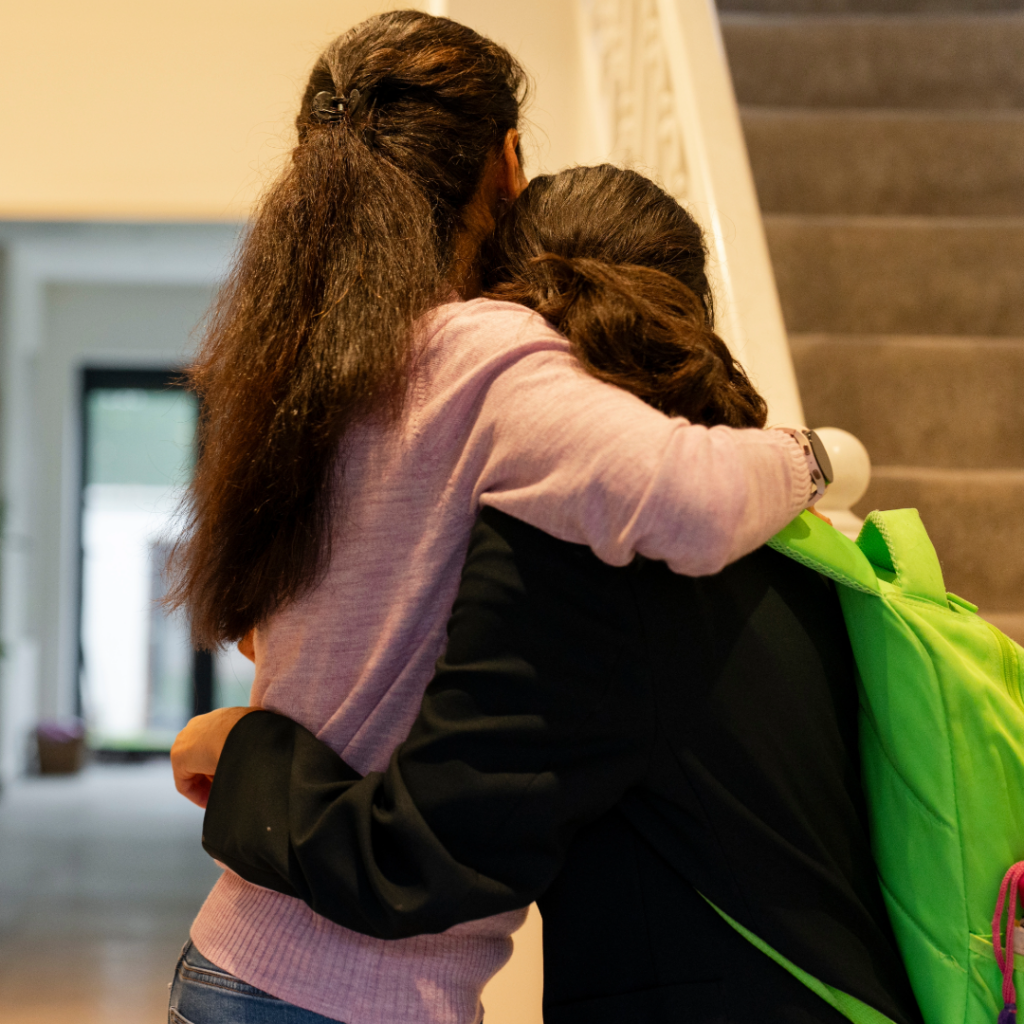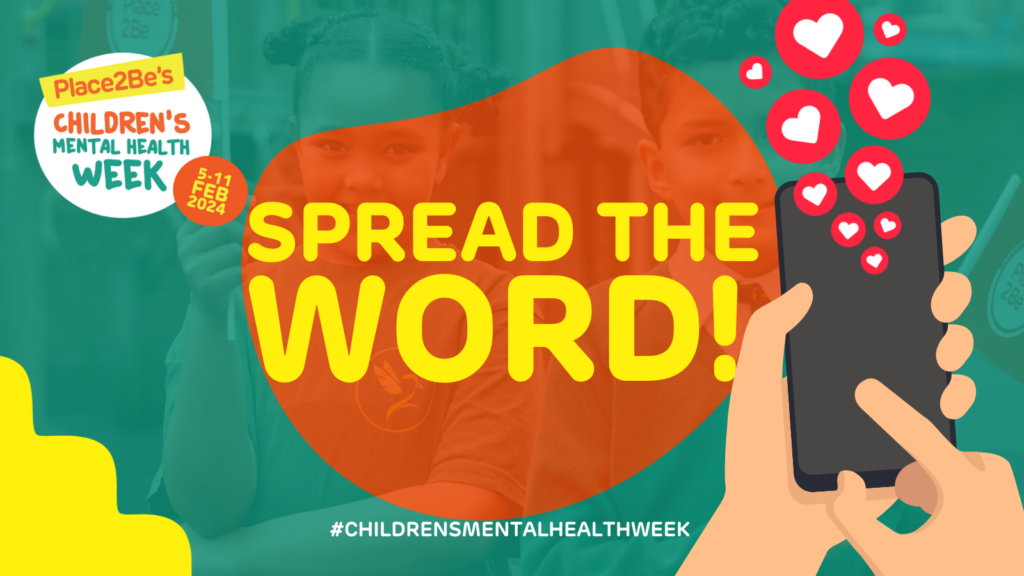5-11 February is Children’s Mental Health Week: a mental health awareness event that empowers, equips and gives a voice to all children and young people in the UK. Keep reading to learn how TPHC’s pan-London mental health programmes are working to support children and young people in London to stay mentally well.

Children and young people are growing up in a fast-changing world, navigating many challenges and pressures which can impact their overall mental wellbeing. Worries about school and college, social pressures, as well as the cost of living and increasing role of social media and growing up online means there is more on young peoples’ minds than ever before.
In England, in 2023, about 1 in 5 children and young people aged 8 to 25 years had a probable mental disorder (1)
Children and young people faced further disruptions during the COVID-19 pandemic, with many experiencing social isolation and missing out on key milestones and experiences. Wider factors such as the role of social inequalities can also mean where a child or young person lives influences their chances of staying mentally well. Efforts are being made in London and elsewhere in the country to improve awareness and tackle stigma around talking about mental health, but we know there are still many children and young people struggling without the right support.
Partnership working to support children and young people
Through our pan-London Partnerships programmes, TPHC aims to help support children and young people in London to have the best chance of staying mentally healthy. We work with partners across the region to help raise awareness and promote a culture of openness and understanding when it comes to looking after your mental health. We also bring together partners across the health and care system in London to identify barriers to access, or delays in pathways to care, and work collaboratively to drive forward change and improvement across integrated care systems and their local boroughs.
TPHC’s children and young people’s mental health (CYPMH) team, part of our Mental Health Transformation programme, leads several areas to help children and young people to have access to appropriate, timely treatment or interventions for their specific mental health needs if and when it is needed. Since spring 2023, the CYPMH team has developed a programme of work in response to the London Mental Health Board agreeing that children and young people’s mental health waiting times is a Pan-London priority area.
Amongst others, the programme aims to understand the current waiting times in London and the factors driving long waits, explore inequalities in access for those on wait lists, learn from young people’s experiences and work with them on solutions, and develop once for London solutions.
Addressing inequalities
Children’s Mental Health week is an important reminder about how the health and care system can contribute to the overall health and wellbeing of all children and young people, regardless of their backgrounds or where they live.
Children and young people from low-income families are four times more likely to experience mental health problems than children from higher-income families (2)
Our pan-London programmes aim to bring together partners across the capital to collaborate and lead initiatives which can help reach communities across boroughs. Thrive LDN is a pan London partnership working to ensure good mental health for all Londoners.
Thrive LDN has developed resources and content to share the voices and experiences of young Londoners. The team also regularly produces practical tools and toolkits sharing ideas and prompts to help you engage with friends, family, neighbours or those you support in your community.
Thrive LDN has also recently expanded their Gift of Reconnection: Trauma Informed practice training, to include resources specifically designed for professionals supporting children and young people. These free resources are designed to help foster an environment where every young person feels seen, hears and supported, creating a place where trauma is recognised and met with compassion.
The CYPMH team has also launched recent guidance for supporting care experienced young people with their emotional and mental wellbeing. Care Experienced young people who have left the care system often face many challenges such as social isolation, financial hardship and problems with their housing. This places additional pressures on them and their health, but also means that traditional services may not be available or appropriate for their needs. The THRIVE Framework has been used as a basis for this guidance to reflect that care experienced young people need a range of support to help them develop and thrive in their current and future lives.
Amplifying and learning from young people’s voices

This year’s Children’s Mental Health week theme is ‘My Voice Matters’, encouraging us all to help empower children and young people, whoever they are, and wherever they are in the world, to be able to say – and believe – “My Voice Matters”.
At TPHC, we value collaboration and involvement with experts by experience, including young people and their families, through our mental health programmes.
Mental Health Youth Board
TPHC’s children and young people’s mental health transformation team has established a Youth Board for young people to share their experiences around waiting times for accessing mental health services. Feedback and experiences are helping us to learn what support is currently being offered during waiting times, and young people’s involvement and contributions will be reflected as we create London-wide solutions to help improve waiting times.
Good Thinking’s Digital Health Ambassadors
Good Thinking – London’s free digital mental wellbeing service, works with organisations including Partnership for Young London and has convened a group of Digital Health Ambassadors (age 15-25) who help to both review and co-create their content and ensure it reflects the issues that affect young people. Read more about how Good Thinking and Partnership for Young London are working together and supporting young people to influence improvement in mental health care.
Visit Good Thinking for mental wellbeing resources including a hub for young people, and practical ‘How to guides’, which offer quick steps to help you check in on friends and family and let them know you care.
Thrive LDN youth events and training offers
Thrive LDN will be supporting the Greater London Authority, Boundless Arts and Stanley Arts for their Rewired: Youth Summit, with events on 24th and 26th February. Over the course of these two days REWIRE will explore how creativity and culture can be the catalyst for tackling the acute youth mental health crisis in London. On Saturday 24th you will hear from the voices and stories of young people, on Monday 26th, key decision makers and partners are invited to hear and engage with the young people with their calls to action.
In partnership with the Association of Colleges, Department for Education and Officer for Health Improvement & Disparities and Thrive LDN are pleased to present two webinars which aim to promote the whole college approach to mental health & wellbeing for staff and students.
To join our webinars please book a space following the links below:
- Supporting the whole college approach: sharing best practice: 21 February 2024, 3-4.15pm
- Supporting the whole college approach: working with local support partnerships/networks: 6 March 2024, 3-4.15pm
Not just a week
By continuing to work together and raise awareness around mental health, throughout the year, we can help children and young people to feel supported to ask for help, or access services, if and when they need to. Learn more about our mental health Partnerships programmes:
About Children’s Mental Health Week
Children’s Mental Health Week was launched in 2015 and each year, hundreds of schools, children, parents and carers take part. Now in its 10th year, the 2023 theme is ‘My Voice Matters’.
Everyone can take part in Children’s Mental Health Week! Download free resources for schools and families and find out how you can take part to raise vital funds and awareness for children’s mental health.
References
(1) NHS Digital (2023). Mental Health of Children and Young People in England, 2023 – wave 4 follow up to the 2017 survey
(2) Gutman, L. M., Joshi, H., Parsonage, M., Schoon, I., Centre for Mental Health, & University College London. (2014). Children of the new century: Mental health findings from the Millennium Cohort Study
